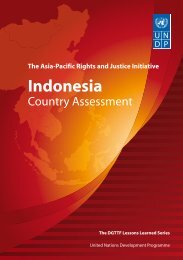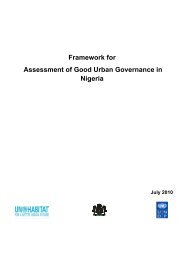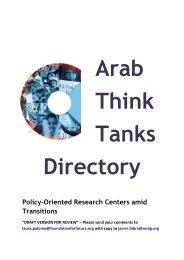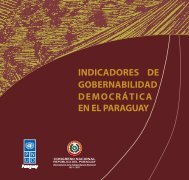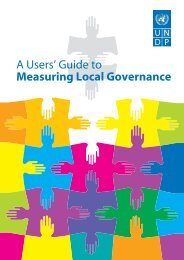planning a governance assessment - United Nations Development ...
planning a governance assessment - United Nations Development ...
planning a governance assessment - United Nations Development ...
Create successful ePaper yourself
Turn your PDF publications into a flip-book with our unique Google optimized e-Paper software.
Internet surveys require special <strong>planning</strong> and design. These surveys can suffer from low response rates.<br />
Developing and implementing internet surveys has become very reasonable in terms of cost. Several very reasonably<br />
priced internet survey services are available, such as Survey Gizmo at www.surveygizmo.com and Survey Monkey<br />
at www.surveymonkey.com. Data collection is usually neat and clean. Again, at least three contacts are required.<br />
You can use regular mail, email or telephone to contact respondents. Usually, very little data cleaning or data set<br />
preparation is necessary with this method, making it the most cost-effective mode available. Some internet survey<br />
providers offer project management and easy-to-use questionnaire development tools. Again, as with mail surveys described<br />
above, this approach works best with populations, such as businesses, NGOs, IOs, academics, the media, government<br />
workers, and others who are likely to have regular access to the internet. These studies rely on a listed sample, a sample<br />
with complete contact information for the participants including names, address, telephone numbers and possibly email<br />
addresses. Access to the internet is increasing daily in most countries, making this inexpensive mode of data collection very<br />
attractive for the right populations.<br />
Telephone surveys may have coverage issues. In many countries, people do not have a phone in their home, and if they do<br />
have a phone, it is usually a mobile or cell phone. Most cell phone providers do not make telephone numbers available for<br />
use in random-digit-dial surveys. If a representative cell phone sample can be drawn, it will still contain a bias, because most<br />
people in developing countries do not have a cell phone either. Moreover, in some countries, incoming calls may be charged<br />
to the person receiving the call, further complicating the process. In addition, software for managing and conducting a<br />
professional telephone survey is very expensive. Telephone surveys are not a viable option in most developing countries.<br />
Focus groups can generate information about the background conditions surrounding <strong>governance</strong> issues. It can help the<br />
researcher better understand the independent variables (causes) that determine <strong>governance</strong> ratings. Focus groups are<br />
usually efficient in terms of time and money. They are highly participatory and have the potential of generating solutions to<br />
the problems identified by the group members.<br />
On the negative side, the focus group approach has certain disadvantages that cannot be ignored. It is very demanding and<br />
requires highly skilled coordinators. Also, since the approach catalyzes collective integrated thinking, it makes individual<br />
ratings insignificant. Yet another drawback is that accuracy can suffer, as some individuals may not feel comfortable to speak<br />
up in public. Focus groups yield less systematic results. The consensus view of most social sciences is that focus groups are<br />
best used to identify issues and develop surveys rather than as the only source of data.<br />
Costs and benefits of different types and sources of data<br />
Different data sources offer different features. Clearly, archival and secondary data sources are very valuable when it<br />
comes to documenting whether laws exist to protect rights and promote democratic <strong>governance</strong> (de jure). Access to this<br />
information ranges from fairly easy to quite difficult. For example, it is relatively easy to examine laws and the constitution,<br />
but it might be difficult to get access to data and information collected by government agencies. As countries move toward<br />
country-led <strong>assessment</strong>s, more administrative data will be used to monitor and evaluate various aspects of democratic<br />
<strong>governance</strong> in various ministries and government agencies. A careful evaluation of these administrative data in terms of<br />
quality, reliability and validity is highly recommended.<br />
Collecting original data requires skill, experience, time and more money. In most countries where a survey is conducted,<br />
the approach will likely be face-to-face, which is the most expensive mode of data collection. Still, in certain circumstances,<br />
various populations such as elites may have reliable access to the internet, telephone, and/or reliable mail service. These<br />
modes of data collection mostly capture the de facto situation and can significantly reduce costs compared to the<br />
face-to-face method.<br />
A thorough <strong>assessment</strong> may well include both archival and secondary data, as well as survey data. It also will likely<br />
include de jure information such as the existence of various laws and objective- or perception-based de facto information,<br />
at both the macro (political institutions) and micro (citizen) levels. Combining different sources and types of data is more<br />
professional and provides more credible results than relying on a single source, form or level of data.<br />
18<br />
Planning a Governance Assessment: A Guide to Approaches, Costs and Benefits




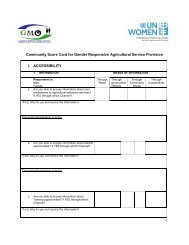
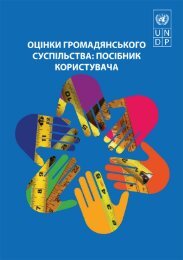
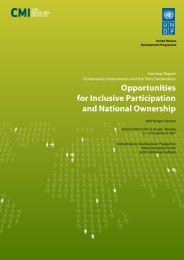
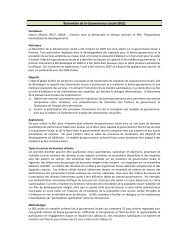
![GuÃa del Usuario ] - Governance Assessment Portal](https://img.yumpu.com/44740603/1/190x253/gua-a-del-usuario-governance-assessment-portal.jpg?quality=85)
